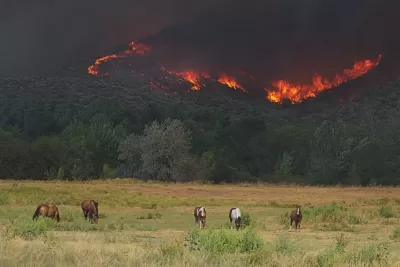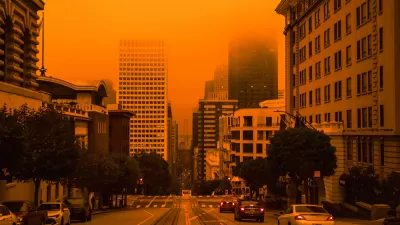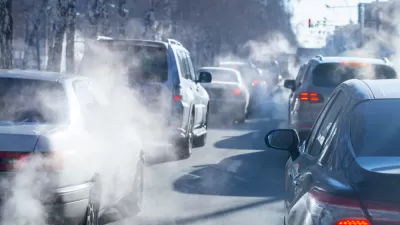Wildfires are consuming forests designated for carbon storage to fight climate change, highlighting the fragility of these carbon offset schemes.

Forests "that are part of carbon-offset projects meant to counterbalance the carbon dioxide pollution being pumped into the atmosphere by human activity" are burning up in the fires consuming the American West, reports Winston Choi-Schagrin. "An estimated 153,000 acres of forests that are part of California’s carbon-offset project have burned so far this summer, according to CarbonPlan, a nonprofit climate-research organization." In Oregon, the Bootleg Fire has claimed nearly 100,000 acres of the Klamath East conservation project.
"California’s carbon offset program works by paying landowners if they commit to managing their land for 100 years in ways that will store more carbon than they would have otherwise. Companies that want to offset their own emissions of greenhouse gases can then buy credits that represent the additional carbon being stored in forests like these."
But "experts say the wildfires have highlighted one of the main weaknesses in the program: the small size of the so-called buffer pool." With the buffer pool, "carbon-offset projects also protect a small percentage of extra land so that if disaster strikes one project, that extra pool of land — with contributions from many different projects — can make up for losses. But too many fires mean that the insurance policy might not be enough." The loss, says Barbara Haya, director of the Berkeley Carbon Trading Program at the University of California, Berkeley, will only increase with climate change.
FULL STORY: Wildfires are ravaging forests set aside to soak up greenhouse gases.

Planetizen Federal Action Tracker
A weekly monitor of how Trump’s orders and actions are impacting planners and planning in America.

The Simple Legislative Tool Transforming Vacant Downtowns
In California, Michigan and Georgia, an easy win is bringing dollars — and delight — back to city centers.

San Francisco's School District Spent $105M To Build Affordable Housing for Teachers — And That's Just the Beginning
SFUSD joins a growing list of school districts using their land holdings to address housing affordability challenges faced by their own employees.

In More Metros Than You’d Think, Suburbs are Now More Expensive Than the City
If you're moving to the burbs to save on square footage, data shows you should think again.

The States Losing Rural Delivery Rooms at an Alarming Pace
In some states, as few as 9% of rural hospitals still deliver babies. As a result, rising pre-term births, no adequate pre-term care and "harrowing" close calls are a growing reality.

The Small South Asian Republic Going all in on EVs
Thanks to one simple policy change less than five years ago, 65% of new cars in this Himalayan country are now electric.
Urban Design for Planners 1: Software Tools
This six-course series explores essential urban design concepts using open source software and equips planners with the tools they need to participate fully in the urban design process.
Planning for Universal Design
Learn the tools for implementing Universal Design in planning regulations.
Smith Gee Studio
City of Charlotte
City of Camden Redevelopment Agency
City of Astoria
Transportation Research & Education Center (TREC) at Portland State University
US High Speed Rail Association
City of Camden Redevelopment Agency
Municipality of Princeton (NJ)





























